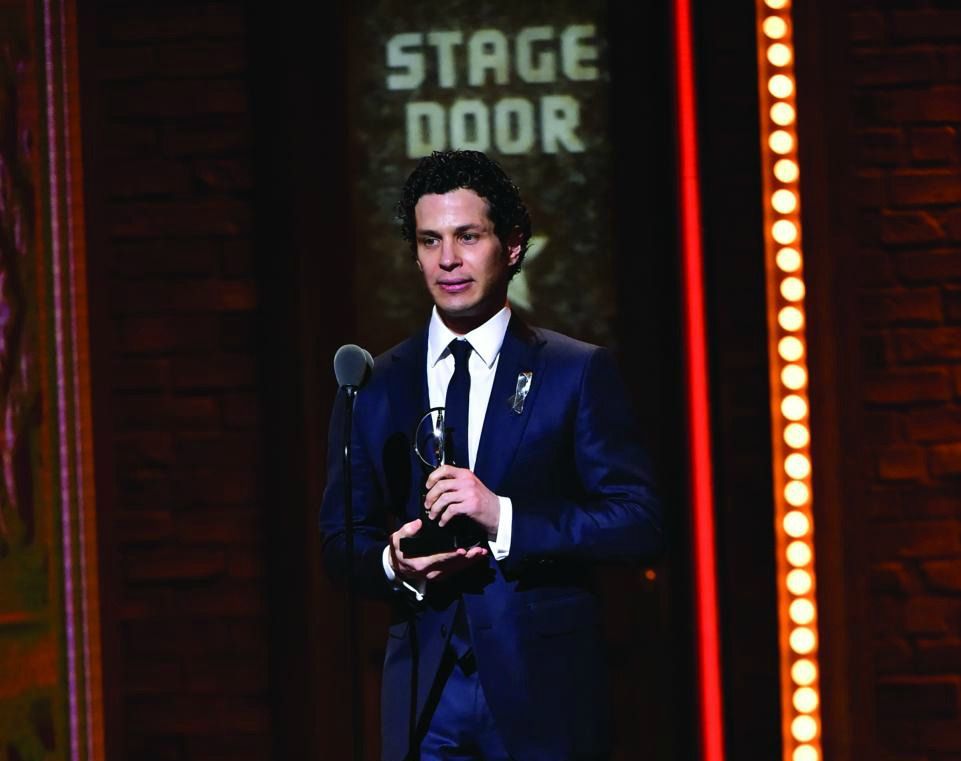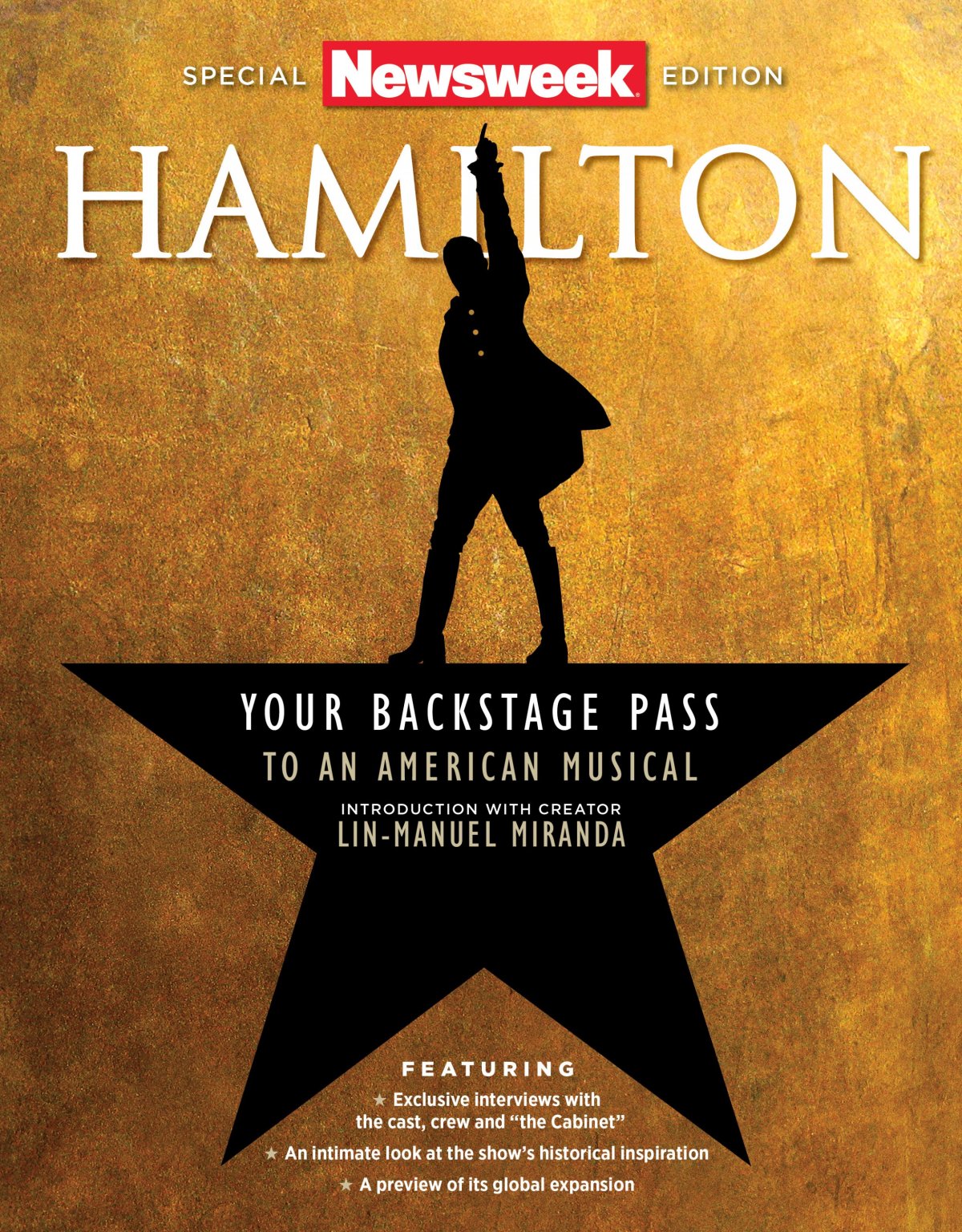
Newsweek spoke with Thomas Kail, the Tony-winning director of Hamilton, about the show's new casts and the challenges of directing a musical phenomenon. This article, written by Senior Editor Tim Baker, and other articles about the Broadway hit, are featured in a new Newsweek's Special Edition.
Right now you're in the process of expanding Hamilton to two new companies as new cast members take over in New York. How are you handling the transitions?
One of the things I started saying to the Broadway company as people started to leave the show—and something that's permeated the conversations we've had about Chicago and as we start to cast San Francisco—is that I'm not going to use the word replace. I'm not going to talk about who is replacing you because no one will replace you. I'd be a fool to try.
What are you looking for if not a similar feeling to what the original cast gave you?
My feeling has always been with casting that you want to fi nd the person who is closest to the essential characteristics you think are necessary for the story to be told. If you look at the cast on Broadway and the cast in Chicago, what you'll fi nd is an extremely consistent level of talent and humanity. But in terms of physical attributes and personality types, there's real variance there. I think that's important.
That speaks to the versatility of the show as a whole...
The show itself is something that could sustain Brian d'Arcy James and Jonathan Gro within a day of each other. Brian was doing the show and then he left and Jonathan started playing the king. That was an important moment for all of us to say to the world, here are two people who probably wouldn't be in the same casting o ce for the same part. Yet in our show, both of them can play King George.
How else do the new productions feel different as they take shape?
Of the 30 or so in the Chicago cast, one of them has done the show before, and the rest are completely new to it. They came to it as people who heard about the show, saw the show, consumed the show as patrons and now are making the show. It feels like our first chance to actually build the bridge without designing and constructing it as we go. Making the last one, we had been rehearsing in one room and Lin would be in the other room. It's like "OK, great! So for that thing with Act Two—I'll be there in a second!" It was a di erent energy because we were still figuring, shaping and building. We now have a blueprint for a show that didn't exist up until we opened the show on Broadway. We were still receiving material three days before our Broadway opening.

Is that normal?
Yes.
What does keep you up at night, if not deadlines?
I think a lot about Lin's hair…I'm not sure where that's going.
It's sad that it's gone.
It was there, and then it wasn't. But what I find myself thinking about a lot is making sure we deliver a show to the city of Chicago that is as carved and shaped and dimensional as the show in New York. We're not trying to replicate the New York show. That show stays here. The reality is nothing can make the fact that Hamilton exists and that we're a part of it untrue. So all the other work we do—good, bad or indi erent— whether it moves people or it doesn't move people doesn't undo what we did. I feel a certain kind of liberation to go and run to the next challenge. Can we take this thing, and can we put it in a new city, a new theater, introduce it to a new audience and try to make them feel as connected as possible to this spirit that Lin imbued all of us with?
In terms of challenges, when you start staging something with so many moving parts, like "Ten Duel Commandments" or "Satisfied," how do you unpack all the different elements to rehearse it?
It's sort of like having to learn multiplication when someone hasn't quite fully explained that you have to know how to do division, too. But those are moments that I think are really thrilling about theater. I feel like people think directing consists mostly of the rehearsal and the tech. The staging of the show is a very signifi cant part of directing and also a very finite part of it. Most of directing is the stuff that's not talked about in reviews and isn't seen in any easily discernable way onstage. A lot of directing is what you say in the elevator on the way up to rehearsal when you happen to be with a cast member, or when you walk out with a writer and you guys have a conversation before she gets on the subway.
Because of the show's popularity, as you expand to new cities with casts, is there a danger of feeling in some ways like a cover band for the original cast?
I don't think so. I'm not an actor, so I don't know that from inside. But having spent a fair amount of time remounting productions with new people in them, I think what you want to focus on as a director is giving everyone permission to make it feel like it's theirs. Even if the pattern you move across on the fl oor was carved earlier, that the way you move through that space is going to be singular and your own.
Is there anything you can do as director to facilitate that?
One of the reasons why the casting for each of the respective roles is so distinct is to accentuate that it's a fool's errand to try to chase down the actor who did it before. If we were doing Streetcar, everyone knows Brando did Streetcar, but at a certain point you have to make it your own. Shakespeare has been revived for hundreds of years, and we still hear about that production of Hamlet or that production of King Lear with new actors going and doing it.
Following the natural course of shows on Broadway, they eventually end up in nonequity houses and high schools. Do you have any advice for the eventual directors of those performances?
If there's one thing I know from having directed revivals, it's my job as a director to try to find something about the show that speaks to me and see if I have a sensibility and point of view that can be articulated while serving the impulse of the writer. It's going to be the same thing. I'm sure there will be a version where the ensemble is twice as big and where the roles aren't doubled and then all kinds of things can happen. I've seen quite a few productions of In the Heights, which is a show I spent six or seven years of my life on. To watch it go and be done at a Boys and Girls club, or LaGuardia Performing Arts High School or see it on the West End was thrilling for me.
Having seen the show hundreds of times by this point, are there still moments that get to you?
Absolutely. But it's a moving target. Often, I'm very struck in watching the show by some moment that's lit incredibly well, that's costumed just exquisitely, where the movement conjured up is just so powerful. I'm also just struck that we're all here because Lin had this idea. This young man thought this thing could be possible and here we are. I'll be watching a moment of "My Shot" where the argument is nuanced and the characterization is really clear, and I'll think, "Oh right, it took him a year to write this song. It took him a year to work on what became fi ve minutes of a show." That is inspiring to me, and that's what makes me want to work on the show well after it opened and makes me want to continue to be around it.
Why do you think the show is resonating with so many people?
In both the determination of Hamilton's life and in the artfulness of Lin's skill and his heart, there's a prevailing and pervasive feeling coming o the show that makes us ask that fundamental question: Have I done enough? And that to me is something we all reckon with. It doesn't matter whether you're going to work in politics or the theater. It doesn't matter if you've ever picked up a pen and written down your thoughts or not. What do we leave behind? Have I done enough? Those are fundamental and often rattling questions to be grappling with. What we're all confronted with in the space of the performance is a moment in time where the promise of America felt like anything was possible. Can we improve on that, and can we still be a version of that nation? But I don't think it's a show about what it means to be American. It's a show that's grappling with what it means to be from somewhere and go somewhere else and try to carve a space for yourself. It's about what it means to try creating some kind of order and sense of purpose in a chaotic and tumultuous time.
This article was excerpted from Newsweek's Special Edition, Hamilton, by Senior Editor Tim Baker. For a backstage pass to the Broadway musical sweeping the nation, pick up a copy today.

Uncommon Knowledge
Newsweek is committed to challenging conventional wisdom and finding connections in the search for common ground.
Newsweek is committed to challenging conventional wisdom and finding connections in the search for common ground.





